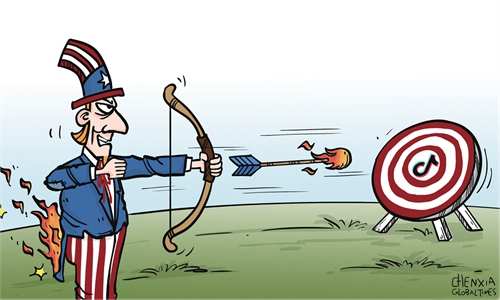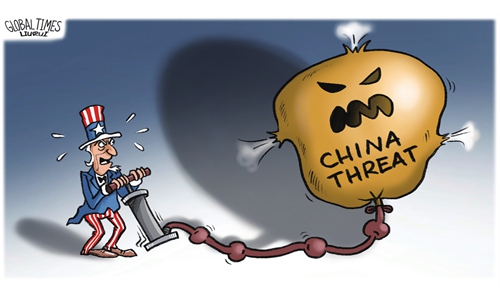
TikTok Photo:VCG
The US has failed to provide any evidence that TikTok poses a threat to US national security, and it should stop spreading misinformation and unreasonably suppressing relevant firms, the Chinese Foreign Ministry urged on Thursday.
The data security issue should not be regarded as a tool for individual countries to over-generalize the concept of national security, abuse state power or unreasonably suppress foreign companies, Wang Wenbin, a ministry spokesperson, said at a press conference.
Wang called on the US to provide a fair, transparent and non-discriminatory business environment for foreign companies.
The Biden administration has demanded that ByteDance, TikTok's Chinese owner, divest its stake in the popular video app or face a possible US ban, Reuters reported on Wednesday.
According to Reuters, TikTok spokesperson Brooke Oberwetter said that "if protecting national security is the objective, divestment doesn't solve the problem: a change in ownership would not impose any new restrictions on data flows or access."
Industry analysts blasted the US crackdown on TikTok, noting companies cannot get fair treatment when they encounter such bullying. They called for active approaches to fight for the firm's legitimate interests and rights.
TikTok has given a series of responses in an attempt to resolve the US' data security concerns and seek a feasible operation pattern in the US market in recent years, including setting up databases overseas and hiring local management teams, among other measures, Liu Dingding, a Beijing-based tech industry observer, told the Global Times.
The popular short-video platform transferred its US users' information to the servers at Oracle Corp in June 2022. It also rolled out a $1.5 billion "Project Texas" to isolate sensitive data from its American users so that only staff in the US will have access, according to media reports.
However, the US has gone far over the line, and giving in to its demands will only lead to more bullying, Liu said.
Protecting national security is only a guise, while the US' true intention is to use government power to interfere with competition in the marketplace, and to suppress competitive foreign companies that are putting pressure on American businesses, Ma Jihua, a veteran industry expert, told the Global Times.
However, from curbs on China's semiconductor industry to the potential ban on Chinese internet companies, Washington's ill-intended crackdown has threatened global supply chains, which will ultimately hurt its own firms and consumers, analysts said.
As for the Chinese firms, there is a broad overseas market for them to thrive. In addition to complying with local laws and enhancing competitiveness, it is crucial for them to actively fight back against bullying, they said, noting that the US crackdown cannot prevent Chinese firms from thriving on the global stage.


